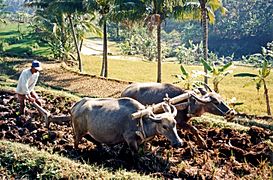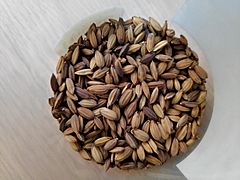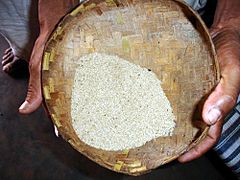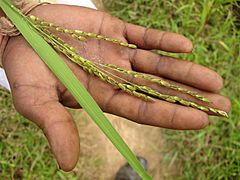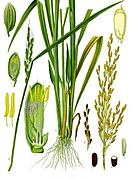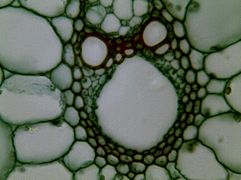Asian rice facts for kids
Oryza sativa, commonly known as Asian rice, is the type of rice that most people eat around the world. It's a very important plant that feeds billions of people. This amazing plant was first grown by people a very long time ago, between 13,500 and 8,200 years ago, in the Yangtze River area of China.
Asian rice is a type of grass. It has a special genetic map, called a genome, which is like a blueprint for the plant. This blueprint is made up of 430 million tiny units called base pairs, organized into 12 chromosomes. Scientists love studying rice because it's easy to work with in labs, especially when they want to learn more about how cereal plants grow and develop.
Quick facts for kids Asian rice |
|
|---|---|
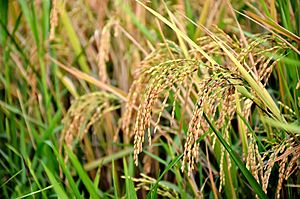 |
|
| Mature seed heads | |
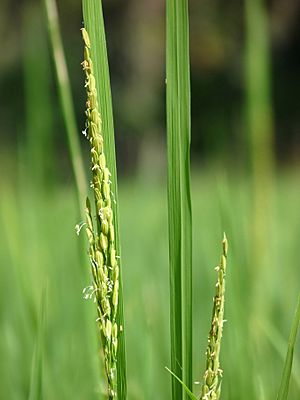 |
|
| Inflorescence | |
| Scientific classification |
|
| Kingdom: | Plantae |
| Clade: | Tracheophytes |
| Clade: | Angiosperms |
| Clade: | Monocots |
| Clade: | Commelinids |
| Order: | Poales |
| Family: | Poaceae |
| Genus: | Oryza |
| Species: |
O. sativa
|
| Binomial name | |
| Oryza sativa |
|
| Script error: The function "autoWithCaption" does not exist. | |
| Synonyms | |
|
List
|
|
Script error: No such module "Check for conflicting parameters".
Different Types of Asian Rice
Asian rice comes in two main types, like two big families:
- The japonica (or sinica) type: This rice is usually sticky and has short grains. It's often grown in drier fields or in cooler places like East Asia.
- The indica rice type: This rice is not sticky and has long grains. It's mostly grown in warm, wet areas of Asia, often in flooded fields.
There's also a third type, sometimes called tropical japonica. This kind of rice has broad grains and grows well in hot, tropical weather. An example is the 'Tinawon' rice, which is grown in the high mountains of the Cordillera Mountains in the Philippines.
Rice also comes in many different colors! You might see white, brown, black, or red rices. Black rice, sometimes called purple rice, can be sticky and is grown in places like Indonesia and Thailand.
Naming of Rice
The word oryza is a very old Latin word for rice. The word sativa means "cultivated" or "grown by people." So, Oryza sativa basically means "cultivated rice." People have been growing rice for thousands of years!
Gallery
-
Water buffalo helping to plough rice fields in Java
-
Rice from Chhattisgarh, India
See also
 In Spanish: Oryza sativa para niños
In Spanish: Oryza sativa para niños
 | Misty Copeland |
 | Raven Wilkinson |
 | Debra Austin |
 | Aesha Ash |


